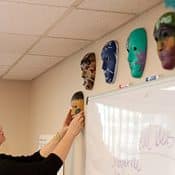About Eating Disorders in Adults
Many people assume, incorrectly, that eating disorders only occur among children and teens. Adult men and women struggle with eating disorders, too, and the consequences can be severe. They affect people of all genders, across all age segments—including middle age and beyond. For many adult men and women, an eating disorder can be wrapped up in how the patient perceives society’s expectations:
- Women: Many women develop a distorted and negative view of their own bodies and compare themselves to fashion models and other idealized stereotypes. In an effort to become more like their role models, they develop attitudes and behaviors that develop into an eating disorder. Among many women, the goal is often to become thin.
- Men: Adult men sometimes engage in a similar process—comparing themselves to masculine stereotypes like athletes. Men also have a tendency in our society to stigmatize the very act of seeking help for an eating disorder—or any mental health issue. This attitude, also based on a stereotype, can prevent some men from seeking treatment for an eating disorder until their health deteriorates dramatically.
Expectations are only part of the issue. For more than half our patients, the eating disorder is associated with one or more co-occurring disorders like addiction, trauma, anxiety, depression and others. These may already be diagnosed, or they may come to light only when the patient seeks treatment for the eating disorder. For long-term recovery to succeed it’s essential to treat these co-occurring disorders too.
Mom Shares How Rosewood Saved Her & Her Family
My gratitude towards Rosewood comes when I look at my kids. I'm so grateful that I've had a second chance to live life differently, so that we as a family can live life differently.


How Rosewood Can Help
At Rosewood, we understand how these dynamics affect men and women of all ages. So our treatment programs focus consistently on the whole patient—not just the symptoms or the disease. We know every patient starts out with their own unique history and background, and we provide comprehensive, customized treatment programs based on each patient’s unique needs, in state-of-the-art facilities. Our warm, intimate environment promotes medical, emotional, spiritual and physical healing that leads to lasting recovery. Our trained, empathetic professionals help patients sort through the issues underlying the eating disorder. With unconditional acceptance, kindness and authenticity as a foundation, we guide patients toward their own insights and their own recovery. So they can rediscover their inner strength, re-establish their identity, and get their lives back. We start from a place of unconditional acceptance, meeting each patient exactly where they are, on their own terms. We approach eating disorder treatment holistically, based on the patient’s unique experiences and needs. We offer comprehensive treatment programs, based on decades of experience and the latest scientific research, for anorexia nervosa, bulimia nervosa, binge eating disorder, as well as co-occurring conditions that often accompany eating disorders. To ensure the highest quality of care, we provide a comprehensive evaluation for each patient. Based on the the patient’s needs, we’ll recommend one of several levels of care. We’ll also assemble a multidisciplinary team, which typically includes a psychiatrist, physician, registered dietitian, nurse and other clinicians. Their goal is to provide the tools necessary for complete recovery. The team meets regularly to review each patient’s personalized treatment plan. It might include elements like:
- Individual and group therapy sessions
- Comprehensive nutrition education
- Life skills training
- Innovative therapeutic modalities including dialectical behavioral therapy (DBT), cognitive behavioral therapy (CBT) and others
- Animal-assisted therapy (AAT) and other experiential therapies
Events that Can Trigger Eating Disorders in Adults
Many adults, perhaps already struggling with inaccurate body image and idealized stereotyping, develop an eating disorder as a response to one or more life events. These might include: issues related to the birth of a child; the death of a friend or family member; a work-related event such as promotion, termination or retirement; relationship problems such as infidelity or divorce; financial problems and other stressful events. Some adults struggle with their eating disorder, quietly and secretively, for years until forced to confront it by a medical event or the intervention of family members or friends. Other adults have a more sudden onset and seek help early, before the disorder causes significant damage to the body. As with other medical problems, the sooner you start treatment for an eating disorder, the more likely you’ll experience a complete and lasting recovery. Rosewood provides hope for patients with eating disorders and proven programs to treat it effectively.
Kira Shares Inspiring Recovery Story
My life used to revolve around my eating disorder. Rosewood has definitely been a life changing experience. I'm alive because of Rosewood.

Free Online Eating Disorder Assessments
Eating disorders affect more than individuals—they affect whole families. If you think someone you know might be struggling with an eating disorder, it helps to have some clarity. Rosewood offers free online assessments that can help you figure out if an eating disorder is involved and what next steps, if any, to take. The assessments can be taken by a friend or relative or by the person who’s struggling. The process is completely confidential, non-judgmental and pressure-free. Just choose the assessment type below and answer the questions honestly and completely. Minors: If you are under 18 years of age you must complete this form with the help of a parent, and your parent must be involved in all aspects of the communication about your online assessment.
- FREE Online Eating Disorder Assessment
- FREE Online Anorexia Nervosa Assessment
- FREE Online Bulimia Nervosa Assessment
- FREE Online Binge Eating Disorder Assessment
One of our compassionate intake specialists will review your responses and call back promptly with results in complete confidence.
Hear about some of Rosewood’s Success Stories

I’m Alive Because Of Rosewood

Alumni Reunion

Rosewood Santa Monica Teen Eating Disorder Treatment
Aftercare and Relapse Prevention
Experience shows that sooner or later a particular set of circumstances will combine with a moment of weakness. Without adequate resources, someone recovering from an eating disorder becomes vulnerable to relapse. A solid relapse prevention plan is essential for helping patients maintain long-term recovery. It’s normal for patients to face temptations, to slip back into the destructive assumptions and behaviors they worked hard to erase. The choices they make in those moments affect them and every member of their family. Because family members are heavily invested in recovery success, too. At Rosewood, relapse prevention starts when the individual begins treatment—not just when they’re being discharged. Relapse prevention planning is a key component in every patient’s treatment plan, and sessions are held at least weekly. In these sessions patients build a solid foundation for recognizing their own personal triggers and establishing tools for disrupting destructive patterns that lead to relapse. Patients learn how to cope with real-life situations that might provoke a relapse, as well as life management skills that build confidence in the patient’s ability to manage the stresses of daily life. As part of our collaborative approach to treatment, our professionals stay in close touch with every patient’s medical providers at home. Typically, this process begins when the patient is first referred to us, and it lasts throughout the course of treatment. When the patient is discharged, their providers are fully up to speed on their progress and any areas that might need to be monitored.
Alumni Support for Adult Patients
In addition to all the therapies our professionals provide, patients derive a lot of strength from the bonds they form with peers during treatment. Even though every patient’s recovery journey is unique, they share the experience of participating in a community of healing. After learning the value of teamwork and accountability during treatment, patients are encouraged to maintain close ties with other alumni after they are discharged. Those ties often form the basis of trusting, supportive friendships that can last a lifetime. Our robust alumni program lets former patients take full advantage of these relationships. Our alumni coordinator contacts every former patient regularly after discharge, just to check in, provide encouragement, and remind them that help is always available if needed. To strengthen these bonds even further, we hold national reunions annually, plus frequent smaller regional events. We also invite alumni to return to Rosewood as guest presenters, helping a new group of patients on their own recovery journeys. Patients are also encouraged to join Operation RecoverED, a unique Rosewood program that raises awareness about eating disorders by making presentations at schools, meetings of civic groups and other venues.
Rosewood Eating Disorder
Treatment Centers & Locations

“Thank you.” Really, I mean it.


I will forever will be in their gratitude for helping me get myself back and leaving ED in AZ.















